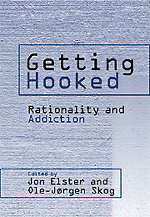Book contents
- Frontmatter
- Contents
- Preface and Acknowledgments
- Contributors
- Introduction
- Addiction and Social Interaction
- Addiction, Weakness of the Will, and Relapse
- The Dangers of Willpower
- The Neurobiology of Chemical Addiction
- To Legalize or Not to Legalize: Is That the Question?
- Rationality, Irrationality, and Addiction – Notes on Becker's and Murphy's Theory of Addiction
- Gambling and Addiction
- A Visceral Account of Addiction
- Epilogue: Rationally Coping with Lapses from Rationality
- Index
The Dangers of Willpower
Published online by Cambridge University Press: 05 June 2012
- Frontmatter
- Contents
- Preface and Acknowledgments
- Contributors
- Introduction
- Addiction and Social Interaction
- Addiction, Weakness of the Will, and Relapse
- The Dangers of Willpower
- The Neurobiology of Chemical Addiction
- To Legalize or Not to Legalize: Is That the Question?
- Rationality, Irrationality, and Addiction – Notes on Becker's and Murphy's Theory of Addiction
- Gambling and Addiction
- A Visceral Account of Addiction
- Epilogue: Rationally Coping with Lapses from Rationality
- Index
Summary
Addiction and dissociation are puzzling phenomena that are not usually thought of as related, although they are often prominent in the same individuals. Both violate our conventions of rationality. Addiction entails the voluntary choice of options that the person himself reports he does not want. Dissociation is a temporary reversal of preference so extensive as to change what the person acknowledges as his “self”; such reversal, for which the person is amnesic, is seen to an extreme degree in multiple personalities and to a lesser extent in fugue episodes, “blackouts,” and the experience of spirit possession. Economic Man, the conventional utilitarian model of how people evaluate choices (Stigler 1980), explains neither, much less suggests any reason why they tend to appear together.
Empirical research on the relationship of dissociation with volitional lapses such as addictions has been sparse. There is a high correlation between dissociation and other self-control disorders: Of 100 substanceabuse patients, 39 percent have been reported to also have a dissociative disorder (Ross et al. 1992), as have 41 percent of 265 male veterans in a substance abuse program (Dunn et al. 1993). Patients with eating disorders also have high rates of dissociative disorder (McCallum et al. 1992, Zerbe 1993). Furthermore, a large proportion of drug addicts have posttraumatic stress disorder (e.g., 59 percent of a female drug rehabilitation population [Fullilove et al. 1993]), which entails many dissociative symptoms.
- Type
- Chapter
- Information
- Getting HookedRationality and Addiction, pp. 65 - 92Publisher: Cambridge University PressPrint publication year: 1999
- 7
- Cited by

